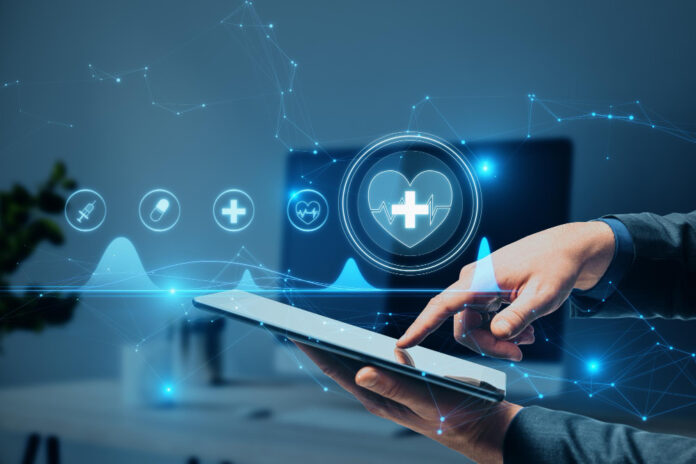The year 2023 promises to be a transformative one for healthcare. With a host of innovative healthcare apps emerging to cater to our diverse medical needs, digital solutions are becoming increasingly indispensable.
Whether you’re looking to monitor your fitness goals or manage chronic conditions, the digital age has ushered in a new era of healthcare accessibility, offering tools and resources right at our fingertips.
In this comprehensive guide, we will delve into the various medical app development and healthcare app development companies and their offerings.
It is our endeavor to provide you with a comprehensive understanding of the products set to revolutionize the way we manage our well-being and healthcare.
The Best of Healthcare Application Development 2023
The confluence of innovations and scientific breakthroughs in technology has drastically changed how we foresaw the future landscape of the healthcare industry.
The below healthcare app development advancements are at the core of changing the wellness culture as you know it –
Patient-centric Apps
Background
The patient-centric app market was worth $10.4 Billion in 2022 and has since grown at an exponential rate.
Healthcare app development services are employing ingenious ways in which technology is applied to enhance the overall patient experience right at home or in the healthcare centers.
Such custom healthcare app development proactive health management facilitates the creation and administering of personalized care plans.
These apps also prioritize privacy by employing robust data encryption and secure cloud storage to safeguard your electronic health records.
Key Players
- Q3 Technologies
This leading healthcare app development company seamlessly integrated the Critical Care platform, aimed to help patients with severe illnesses through a transformative Digital Solution designed to bridge the gap between a patient’s home and their doctor’s clinic.
The web and mobile application comprised key features such as symptom recording and tracking, workflow-guided action, remote communication and reminder setting.
MDacne
The healthcare app developers deal with a problem not as critical as other problems addressed here, but a very prominent problem all over the world.
They provide personalized acne treatment which can provide treatment based on your skin in 5 minutes by taking a few photos and answering a few questions.
- Athenahealth –
The healthcare app developers at Athenahealth are working on empowering patients with tools that improve engagement by making them able to easily view test results, message their care team, self-scheduling appointments, and perform self-check-in.
- MySugr –
This healthcare mobile app development company allows patients to track their blood sugar, carbs, bolus (administered amount of medication), and estimated HbA1c (blood test showing average blood sugar) all at a glance.
- Generis –
This healthcare mobile application development company provides an easy-to-use app that can analyze and help you understand your genes to provide DNA-based advice.
The DNA can be retrieved from 23 and ME and Ancestry.com, and the app provides personalized recommendations based on that, as well as on goals and lifestyle inputs.
Provider-focused Apps
Background
Provider-focused apps are designed with doctors and healthcare professionals in mind, aiming to streamline patient care.
These applications integrate medical prescription management tools, telehealth services, and electronic health records (EHR/EMR) capabilities.
Key Players
- Clipboard Health –
A healthcare app development company that connects healthcare professionals with open shifts at various facilities. This allows flexibility and freedom to them, and staffing solutions for facilities.
- Doximity –
This healthcare mobile application development company allows healthcare professionals to use telehealth technology to manage and treat patients. It offers various handy tools to maintain privacy and ensure smooth interaction.
- Lybrate –
This medical app development company has made a platform that patients can use to consult doctors of various major specialties online about various health and fitness queries, or instantly book an appointment to visit them at a clinic.
- Teladoc –
The company empowers medical professionals with telehealth facilities using which, if medically necessary, doctors can also quickly prescribe medication and connect with the pharmacy of choice. A board-certified doctor is available 24/7.
- Siemens Healthineers AG –
Their solution “Syngo Carbon” is a comprehensive platform that integrates and streamlines image interpretation and reporting across various departments.
Administrative and Management Apps
Background
Administrative and management apps now play a pivotal role in maintaining compliance with several healthcare regulations such as HIPAA, GDPR, FDA rules, and ISO info security guidelines.
They also enhance the efficiency of healthcare organizations by integrating Electronic Health Records (EHR) and Practice Management (PM) functions, facilitating the treatment, invoicing, and payment processes.
Key Players
- SafetyCulture –
Formerly called iAuditor, the software helps healthcare facilities adhere to local, state, and national laws by helping them manage data and optimize day-to-day operations.
- ZenQMS –
This healthcare application development company provides cloud-based quality management software that also assists in maintaining compliance. It allows a comprehensive tracking of training and document life cycle to promote adherence to regulations
- MedStack –
This is a HIPAA (Health Insurance Portability and Accountability Act) compliant software solution specifically made for digital healthcare institutions and services like telemedicine, mental health services, and smart medical devices.
It allows for real-time audits and is integrated with various authorities.
Combining software and Hardware
Besides the software-only solutions, below are some examples of how technology is helping you track and control your wellness in a way that has never been possible before:
Internet of Medical Things (IoMT)
Background
The Internet of Medical Things (IoMT) links various medical devices through the internet, to create a seamless flow of patient data.
IoMT leverages sensors in app development for healthcare, wearables, and data analytics to provide real-time patient information, enabling early diagnosis and remote patient monitoring, ultimately placing you at the center of your healthcare journey.
Key Players
- GE Healthcare –
Among the largest in the IoMT industry, GE Healthcare has launched several smart solutions for many different imaging equipment such as ultrasound, tomography, invasive cardiology, radiography, etc.
- Philips –
The company has developed Wi-Fi modules that are compatible and ready to be assembled into existing devices making it an exciting and affordable opportunity.
- Medtronic –
Another industry leader in IoMT, the healthcare application development company specializes in smart devices for vascular and cardiac procedures, restorative therapies, minimally invasive treatments, and diabetes.
Smart Wearables
Background
Smart wearables are items you must already be very much exposed to.
These are fitness trackers, smartwatches, heart rate monitors, and various other wearables that utilize advanced sensor technology to continuously monitor vital health metrics such as heart rate and blood oxygen levels.
These devices work seamlessly with compatible apps you can download onto your smartphone to store and analyze your health data, and derive valuable insights into bettering your well-being.
Key Players
- Apple –
The smart wearable journey began for Apple with the Apple watch which was a resounding hit and can help you record with incredible accuracy an elaborate vital profile including ECG, sleep time, blood oxygen, etc.
- Neurotech –
A leader in the wearable Electroencephalogram (EEG) industry, it can provide long-term continuous monitoring to identify electrographic seizures and baseline changes right at home or at facilities.
- Athos Training System –
Athos is in the niche class of smart wearables that is clothing. Focussing on fitness apparel, they have developed an activity tracking device called “Core” that can use the sensors on the company’s clothing to track the user’s muscle activity.
Conclusion
The fusion of technology and science continues to evolve the healthcare industry into something unimaginable year after year.
The ingenuity of various healthcare mobile app development companies has brought us to a brand new landscape of medicine.
Although we cannot see too far ahead on the path we are on, one thing is certain, more innovative strides, better patient care, and more accurate diagnostics, are all but a certainty.











![How to Fix [pii_email_cbd448bbd34c985e423c] Error Code? [pii_email_cbd448bbd34c985e423c]](https://www.techwebtopic.com/wp-content/uploads/2022/02/pii_email_cbd448bbd34c985e423c.jpg)



